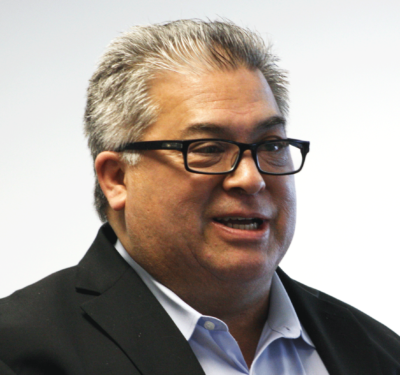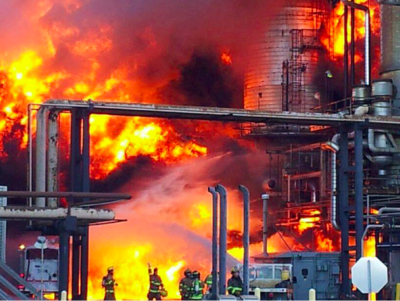Cal/OSHA’s challenge is to promote fair and effective enforcement of the state’s safety regulations while maintaining the respect of both labor and of the industries it regulates.
Nobody embodies that delicate balance better than Clyde Trombettas, statewide manager and policy advisor for the Division of Occupational Safety and Health Process Safety Management Unit.
Trombettas, by all accounts, has effectively managed the unit for several years. He has overseen the state’s refineries and chemical plants, plus other dangerous industries subject to the PSM regulations, since 2005, and was promoted in 2014. His position now is in the Career Executive Assignment (CEA) category, a high administrative and policy-influencing position. He manages some 30 compliance officers, four PSM district managers, several senior safety engineers, and support staff.
Prevent Accidents, Not Just Respond To Them
Trombettas is recognized for his work on regulatory changes to the PSM standards designed to prevent major refinery incidents. They went into effect in 2017. The idea was to avert danger and accidents rather than responding to them. The new system shifts PSM from controlling and responding to risks to preventing risks up front.

“outreach and education, along with a targeted enforcement program, will achieve greater compliance and reduce injuries, illnesses and fatalities…”
– Clyde Trombettas
For instance, one of the bills resulting from the Chevron incident was SB 1300, which requires refineries to submit to the PSM Unit a full schedule of their planned turnarounds, which have been the source of many incidents. “We’ve never had a system in place that requires this transparency,” Trombettas told us back when the bill was still under consideration. “We never had access to that information.”
Now the unit performs detailed and extensive Program Quality Verification inspections to detect refinery hazards and head them off.
It performed four such inspections in 2018, as well as another four turnaround inspections. Inspections at the PBF Torrance (formerly ExxonMobil) covered some 2,800 hours in 2017, and concentrated on the use of hydrofluoric acid, prompting PBF to find a safer way to use the substance that went “above and beyond,” as Trombettas puts it. He says the refinery even thanked DOSH for bringing the issue to its attention.
Don Wilson, plant manager of Valero Refining’s Benicia facility, has known Trombettas since the early 2000s when he was the safety manager at the refinery, and Trombettas was a Cal/OSHA safety engineer.
“He’s very intelligent when it comes to the challenges that the refining industry has,” Wilson tells Cal-OSHA Reporter. “He does his homework, and I think he’s been very responsible. We don’t always agree, but it certainly means we can be respectful and have meaningful discussions.”
The PSM unit was formed in the wake of another major incident at the former Tosco refinery in Avon, near Martinez, in 1999.
The unit was beefed up, under Trombettas’ leadership, in the wake of the 2012 Chevron Richmond explosion and fire, which called into question whether the state was doing enough to protect workers and communities in general from the hazards of producing gasoline and other petroleum products.
Understands Labor’s Concerns
Trombettas is known not only for his good relations with the refineries, but he also knows, understands, and is empathetic of labor’s concerns. He has labor experience.
He formerly was the negotiations and grievance chair for Oil, Chemical & Atomic Workers Union Local 1-326, now known as United Steelworkers Local 1-326. Carrolle Mendez, a member of the local and the Voluntary Protection Program coordinator at the Phillips 66 Refinery, says “my experience with him has always been good. Our facility has a good relationship with him.”
She says refinery workers have a quarterly meeting with Trombettas known as Coffee with Clyde. “We sit down and talk, there no specific agenda. It’s just the union personnel, no management, and management has agreed to let us do that.”

At the first Coffee with Clyde, management attended, but left after 20 minutes “so we could have our freedom.” She says the result has been the development of a “great labor-management relationship.” Allowing the informal meetings with the PSM manager “showed trust,” Mendez says. Both labor and management “think of him as fair.”
“It is my belief that effective outreach and education, along with a targeted enforcement program, will achieve greater compliance and reduce injuries, illnesses, and fatalities throughout the workforce community,” Trombettas has said.
A good leader does not shy away from a confrontation when it is necessary. The amiable Trombettas isn’t the confrontational type but isn’t afraid to defend his organization.
When the U.S. Chemical Safety and Hazard Investigation Board (CSB) started stepping on DOSH’s toes during the Chevron investigation, Trombettas got them to step back off.
CSB had speculated that the ignition source for the 2012 explosion was a fire pole rupturing the pipe. Cal/OSHA disputed that. The source was a corroded pipe section that broke loose. Trombettas took to social media to denounce what he saw as CSB “grandstanding.” The two agencies now work well together, but the point had been made: DOSH was the lead investigating agency.
Later, when the PSM Unit was beefing up its inspection staff, the San Francisco Chronicle suggested that the unit was hiring green safety professionals who would be easily bamboozled by oil industry veterans. Trombettas quickly set the record straight, for DOSH, and there have been no subsequent allegations. In addition to new-hire training, PSM inspectors receive more than 300 hours of training on such subjects as PSM for refineries and chemical plants, advanced PSM and process piping.
Trombettas and his team also have spread the California PSM safety culture outside the state. They have taught PSM basics to state inspectors in Washington, and that state is moving to adopt reforms to its PSM regulations based on the California model. Trombettas and other members of the unit have met with their counterparts to the north to discuss the California version.
Several years ago, Trombettas also worked to bring safety culture awareness to the African nation of Ghana, through his work for the Occupational Safety Council of America. He worked with the country’s minister of employment and labor relations to craft safety and health legislation and introduce a version of the Injury and Illness Prevention Program. But the regime didn’t last, and the official was fired. But Trombettas planted a safety and health seed that is taking root.

